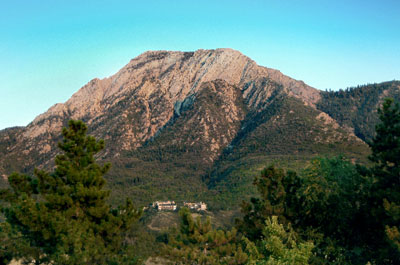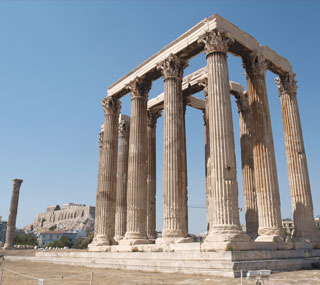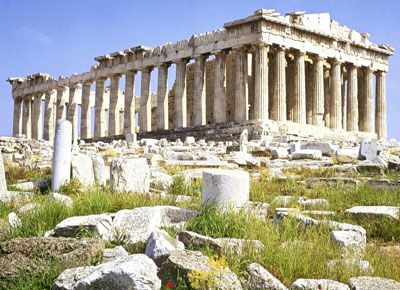Greece
Country statistics

Land area: 50,502 sq miles (130,800 sq km)
Total area: 50,942 sq miles (131,940 sq km)
Population (2006): 10,688,058 (growth rate: 0.2%); birth rate: 9.7/1000; infant mortality rate: 5.4/1000; life expectancy: 79.2; density per sq miles: 212
Capital City: Athens
Monetary unit: Euro (formerly drachma)
Languages: Greek 99% (official), English, French
Ethnicity/race: Greek 98%, other 2%; note: the Greek government states there are no ethnic divisions in Greece
Religions: Greek Orthodox 98%, Islam 1.3%, other 0.7%
Country introduction

Greece is a country in South-east Europe, with Athens being the capital and largest city (its urban area also including the municipality of Piraeus). It borders with Albania, the Republic of Macedonia and Bulgaria to the north, and Turkey to the east. The Aegean Sea lies to the east of mainland Greece, the Ionian Sea to the west, and the Mediterranean Sea to the south. Greece's coastline feature a vast number of islands (approximately 1,400, of which 227 are inhabited), including Crete, the Dodecanese, the Cyclades, and the Ionian Islands among others.
Greece consists of about 80% mountains and rocky terrain, with the occasional plain. The Pindus Mountains start in Northern Greece and stretch south to the Gulf of Patra. In the southern part of Greece are the Peloponnesus Mountains. Mount Olympus is the highest at 2,917 m (9,570 ft), located on the border between Thessaly and Macedonia.
About 20% of Greece is made up of islands. Crete is a large island located in the Mediterranean Sea. It is a popular tourist area for its beautiful mountains, coastline, and many ancient ruins.
Most of the people in Greece live along the coast, or along rivers and harbors.
The culture

The culture of Greece has evolved over thousands of years, with its beginnings in Ancient Greece, through the influence of the Roman Empire, the Byzantine Empire, the Ottoman Empire, and Greek independence. Greece is often called the cradle of Western civilisation.
Ancient Greece produced many philosophers and scholars, such as Socrates and Plato. These Greeks contributed significantly to our current culture. They created the first democratic government, discovered many scientific principles, and created mathematics. The Greeks also contributed to the artistic community with Homer, who wrote the Iliad and The Odyssey, and other artisans creating sculptures, paintings, pottery, poetry and playwriting.
Attractions & landmarks

The people of Greece were one of the earliest civilizations. Greece still has many ancient ruins, some over 4000 years old. Greece also has many medieval churchs. This makes Greece a very popular tourist area. Greece is also well known for its sculptures, paintings, pottery, poetry and playwriting.
The capital city, Athens is home to many ancient sites. Famous landmarks include the enormous Temple of Olympian Zeus in Athens, which was built around 1,500 years ago for the worship of the Greek God Zeus. Athens' Acropolis towers is also another famous landmark in Europe and the classical Greek architecture has become a symbol of the city. Built around 2,500 years ago, the Acropolis has several temples, of which the most important build is the Parthenon, dedicated to Athena, a Greek goddess.
Lycabettus Hill is one of the several hills centrally located in Athens. Climbing the hill will reward visitors of spectacular and breathtaking views of Athens and the coastal region.
Syndagma Square, located across the Greek parliament, is considered to be the heart of modern Athens. The attractive Greek Parliament building is ideally located next to the National Garden and the parliament, also called the Royal Palace.
Competitive sports were a major part of Greek life. The first Olympic Games were held in Greece in 776 BC. Some of these stadiums are still around today including the Olympia Stadion.